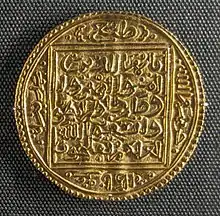Muhammad V of Granada
Abu Abdallah Muhammad V (Arabic: أبو عبد الله محمد الخامس) (4 January 1339[1] – 16 January 1391), known by the regnal name al-Ghani bi'llah (Arabic: الغني بالله, romanized: al-Ghanī bi-ʾllāh, lit. 'He who is contented with God'),[2] was the eighth Nasrid ruler of the Emirate of Granada in Al-Andalus on the Iberian Peninsula.
| Muhammad V | |
|---|---|
 Dinar minted in Muhammad V's name during his second reign | |
| Sultan of Granada (1st reign) | |
| Reign | 1354 – 1359 |
| Predecessor | Yusuf I of Granada |
| Successor | Ismail II of Granada |
| Sultan of Granada (2nd reign) | |
| Reign | 1362 – 1391 |
| Predecessor | Muhammad VI of Granada |
| Successor | Yusuf II of Granada |
| Born | 4 January 1338 |
| Died | 16 January 1391 |
| Dynasty | Nasrides |
| Father | Yusuf I |
| Religion | islam |
Muhammad V was the eldest son and heir of Yusuf I by his slave Butayna, born on Sunday, 4 January, 1339. He also had a younger full-blood sister, A'isha, two half brothers and five half-sisters. He ruled between 1354–1359 and 1362–1391, and is best known for completing the royal palace of the Alhambra with the Palace of the Lions and the Mexuar, or Cuarto Dorado.
Sultan
He inherited the throne from Yusuf I but was overthrown in August 1359 by his half-brother Ismail II and sought protection with the Marinid sultan of Fez, where Muhammad was inspired with fresh examples of architecture. Isma'il was overthrown and murdered with his brother Qays less than a year later in 1360, by his brother-in-law, Abu Said, who ruled as Muhammad VI but was overthrown in turn by Muhammad V, who returned to the throne for another 29 years.
During the three-year period of the reign of Muhammad VI, Muhammad V was plotting his return to power. A chance came in 1362 when King Peter I of Castile (Pedro el Cruel) lured Muhammad VI to his kingdom. There, in Seville, he was murdered and his head sent to Muhammad V as a gift upon his return to the throne. As a gesture of good relations between him and the Marinid, the eldest son of Muhammad V, Yusuf II, married to a daughter of the Marinid Sultan. His hospital in Granada was completed in 1366. He employed the poet and diplomat Ibn Khaldun in negotiations with Pedro the Cruel.
Death
Muhammad V died on 16 January, 1391. He had at least four sons; Yusuf II, Nasr, Muhammad and Sa'd. He was succeeded by his son, Yusuf II.
References
Sources
- The Alhambra From the Ninth Century to Yusuf I (1354). vol. 1. Saqi Books, 1997.
- Pedro the Cruel of Castile 1350-1359 (The Medieval Mediterranean : Peoples, Economies and Cultures, 400-1453, Vol 6) by Clara Esto; Brill Academic Publishers, 1995
- The Three Great Sultans of al-Dawla al-Ismā'īliyya al-Naṣriyya Who Built the Fourteenth-Century Alhambra: Ismā'īl I, Yūsuf I, Muḥammad V (713-793/1314-1391) Antonio Fernández-Puertas, Journal of the Royal Asiatic Society, Third Series, Vol. 7, No. 1 (Apr. 1997), pp. 1-25
- Latham, J.D. & Fernández-Puertas, A. (1993). "Naṣrids". In Bosworth, C. E.; van Donzel, E.; Heinrichs, W. P. & Pellat, Ch. (eds.). The Encyclopaedia of Islam, New Edition, Volume VII: Mif–Naz. Leiden: E. J. Brill. pp. 1020–1029. ISBN 978-90-04-09419-2.
Muhammad V of Granada Cadet branch of the Banu Khazraj Born: 1338 Died: 16 January 1391 | ||
| Regnal titles | ||
|---|---|---|
| Preceded by Yusuf I |
Sultan of Granada 1354–1359 |
Succeeded by Ismail II |
| Preceded by Muhammad VI |
Sultan of Granada 1362–1391 |
Succeeded by Yusuf II |
